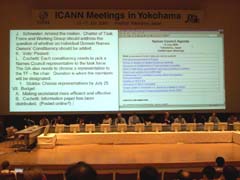The ICANN meeting in Yokohama, Japan, is intensely political. That befits an event that will help determine the future of the Internet, as I explain in my Friday column.
It’s also turning into a classic bureaucracy.

The group shown meeting here is the Names Council, which is “responsible for the management of the consensus-building process” of the DNSO, or Domain Name Supporting Organization, which is one of the three so-called “supporting organizations” within ICANN. Are you with me so far?
Actually, once you get accustomed to the lingo it’s fairly accessible. You can follow the meeting yourself — live, if you wish — by visiting the excellent ICANN meeting remote participation and archives Web site run by the folks at Harvard Law School’s Berkman Center for Internet & Society.
After filing my column for the newspaper, I learned about what may be a serious issue for those of us who want to see ICANN’s process be more, not less, open. Proposed changes in the ICANN by-laws may undermine the current policy that requires the 19-member board of directors to have at least nine “at-large” members — that is, people who aren’t tied to a specific constituent group. The proposed changes may effectively remove the at-large board membership unless the board explicitly votes to continue the at-large membership.
This comes at a time when the board is about to give the public the right to vote on the at-large members. Activists who want more public participation worry that the ICANN board and staff are playing a sneaky game.
We’ll know more over the weekend what the story is here.
